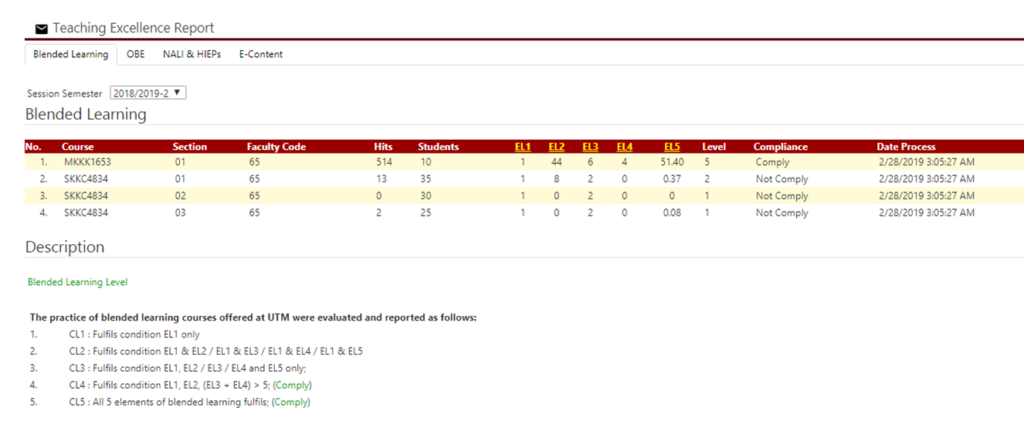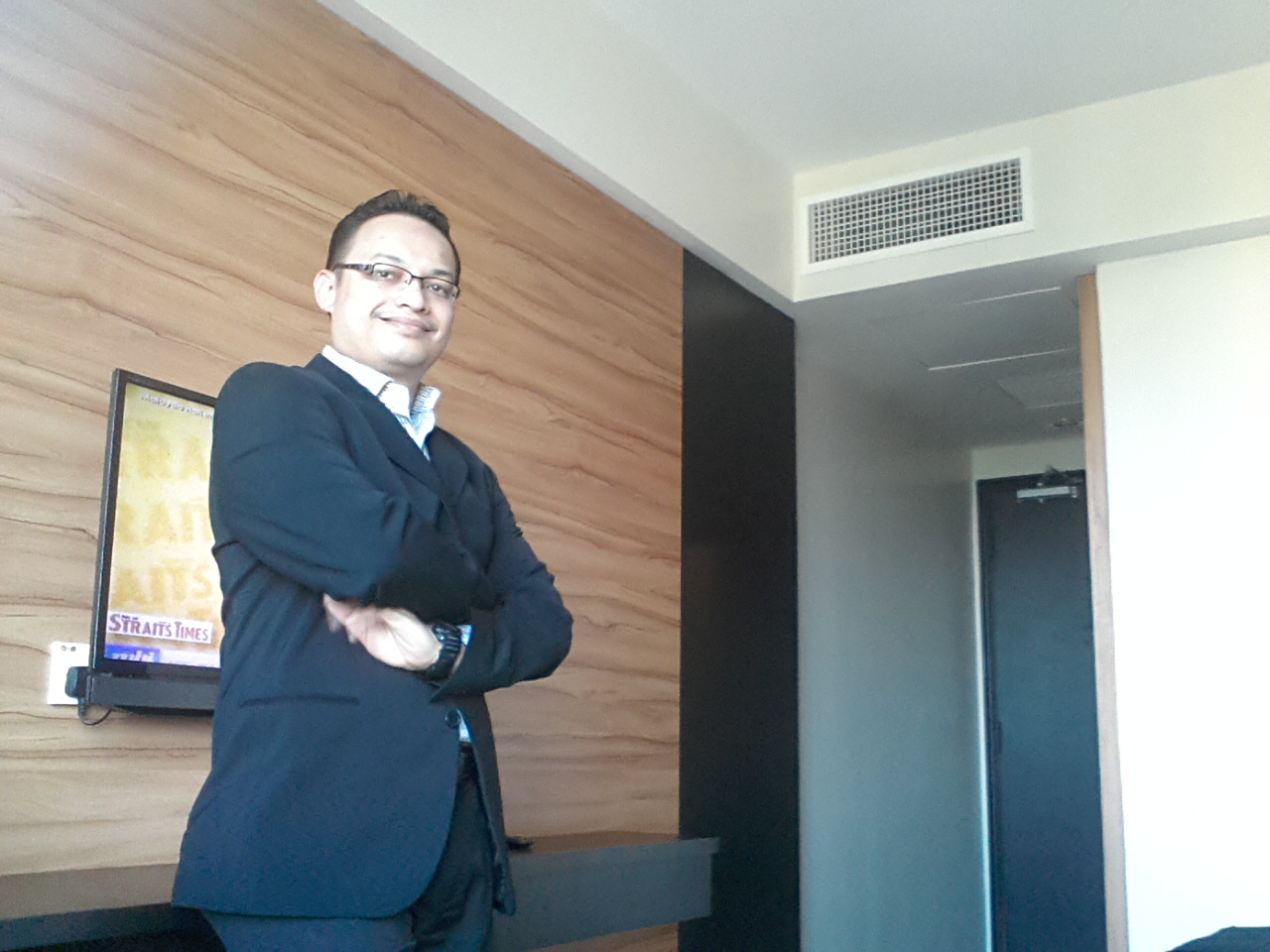I am very happy that I reached Level 5 for Blended Learning for my Master MKKK1653 in just Week 5 in this semester.
Comply Level 5 of Blended Learning for Master MKKK1653
SPIRIT OF STUDENT CENTERED LEARNING (SCL)
[NALI2018 25-26 SEPT 2018]
Alhamdulillah syukur to Allah for allowing us to share and showcase our project that we have carried out for several years to wider audience. We have practiced the Student Centered Learning (SCL) strategy since 2005, which amazingly fulfills the requirement of New Academia Learning Innovation (NALI), in the first year course titled “Introduction to Engineering”.
The project that we exhibited in NALI2018 is named “Designing a first year Introduction to Engineering course” won the gold medal. All of this is made possible by the commitment, cooperation and tremendous efforts displayed by all the team members.
Team members: Dr. Aziatul Niza, Dr. Mohd Kamaruddin Abd Hamid, Dr. Siti Hajjar Che Man, Dr. Arif Aziz, Dr. Azmahani, Dr. Hashim Hassan, Dr. Mimi, Prof. Khairiyah, Fazirah Jumari and myself.
We strongly hope and wish to see SCL being widely implemented for the benefit of our future generations. InsyaAllah.
Congratulations to other SCL practitioners too ![]() 🙂
🙂
Photos credit to Datuk Supandi ![]() 😉
😉
#activelearning
#corporativelearning
#studentcenteredlearning
#nali
#learningtechnology
#corporativeproblembasedlearning
#cpbl
#al
#cl

Receiving the Gold Medal Award from Datuk Nazri, UTMLead Director.

Trying my best to convince the judge 🙂

Explaining to the judges.

The medal and the certificate.

NALI 2008 at Dewan Sultan Iskandar (DSI), UTM

This is the first NALI2018 event organized by UTM.

After the judging session…

Receiving the Gold medal from UTMLead Director, Datuk Nazri.

Philosophy of the NALI2018 in conjunction with our ITE class.

Finalist for NALI2018 Award for Process Control & Instrumentation course.
Pushing for Effective Engineering Education

It’s the first day of the new semester. Welcome back all students 🙂 … and luckily I managed to start the class in between 2 public holidays 🙂 pheeewww…
Studying / learning fact-based subject such as History or Geography seems easy via a traditional class lecture style. However, we are not sure whether the student can capture, comprehend and apply what they just learned. Such traditional lecturer can be a “syok sendiri” situation, which is easy to deliver for the teacher/lecturer. Well, there is no different with this subject called “Refinery and Petrochemical Technology” (SKKC4723) for the final year students, which I am teaching this semester. This subject is full pack with petrochemical glossaries of chemicals, processes, equipment and others.
In order to make the learning experience more interesting and to ensure student can comprehend the subject better, we implemented Active Learning (AL) and Cooperative Learning (CL). As early in the first class today, we have attempted to create a lively learning environment situation. We provided questions, allow the students to figure out and search for the answers individually, then discuss the answers with their neighbouring friends, and eventually gave them the opportunity to share their answers to the entire class.
Synopsis of Refinery and Petrochemical Technology (SKKC4723) subject
This course presents the principles for chemical and physical processing in the Petrochemical and Refinery technologies. In particular, it emphasizes on the purpose of the process, understanding reaction chemistry, and their application. The course features extensive reading exercises as well as individual/group project and assignments.
Course Outline (CO)
CO1 – Ability to identify the source of raw material uses to the refinery and petrochemical industries and their applications.
CO2 – Ability to explain the process equipment and able to explain the concept behind the process.
CO3 – Explain and compare the processes involved in fractionation/separation, thermal conversion, catalytic conversion, polymerization.
CO4 – Analyze, adapt and design solutions for the current chemical processing to relate with the current working environment.
CO5 – Demonstrate ideas effectively via project report and presentation
CO6 – Work independently, and as a member or a leader in a team to carry out a project on refinery and petrochemical industry.
CO7 – Seek and manage the information and knowledge related to petrochemicals industries.
Brief facts about the first class (10th September 2018):
- In the first day of class, 12 students attended. I am expecting the class to be around 20 students. Mainly because some students are not back yet to the university.
- Today’s class consisted of 10 Malaysian student, 1 Indonesian student and 1 Japanese student.
- So far, I have only male students.
- Communication are via Whatsapp group which was created 1 week before the class started and contents for the class are shared via eLearning.
- Survey form was given to the students before class to assess their understanding on all 7 Course Outline for this subject. We shall evaluate the same form later at the end of the semester.
- 2 major activities were conducted in the class which was (1) letting the student to view the overall Refinery / Petrochemical processes, learn individually, discuss in pairs and later allowing them to volunteer to explain in class, and (2) assembling them into 5 small groups to investigate and prepare notes on the raw materials required for the Refinery / Petrochemical industry. Later the students presented their work to the class.
- In this first class, we pretty much covered CO1, CO4, CO5, CO6 and CO7. But this doesn’t mean those COs are done being covered and assessed. We will have quizzes, test, exams and few more activities in class so that the students can really grasp the knowledge from this subject.
My hope is for the students to fully understand this subject and able to apply it soon when they work.
#ActiveLearning
#CooperativeLearning
#EngineeringEducation












